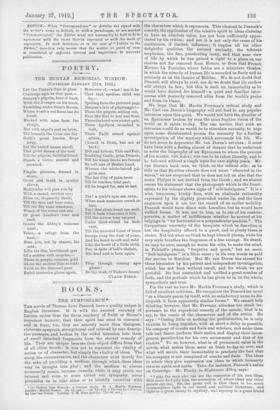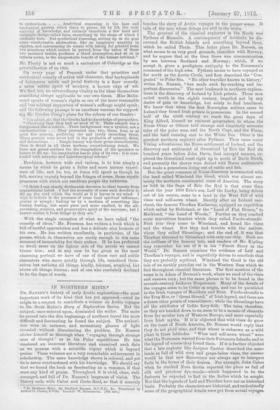BOOKS.
THE SYMPOSIARCH.* TnE novels of Thomas Love Peacock have a quality unique in English literature. It is with the amused curiosity of Lucian, rather than the fierce mockery of Swift or Sterne's impudent humour, that their spirit has most in common ; and in form, too, they are scarcely more than dialogues, elaborate symposia, strengthened and relieved by rare descrip- tive passages, and broken by the wilful intrusion into them of small detached fragments from the eternal comedy of life. They are unique because their object differs from that of all other novels: it was not to represent the vitality of action or of character, but simply the vitality of ideas. The story, the circumstances, and the characters exist merely for the sake of providing a medium through which these ideas may be brought into play ; and the medium is almost necessarily comic, because comedy, while it may excite our interest and even to some extent our sympathy, never persuades us to take sides or to identify ourselves with • (1) Thomas Low Peacock a Critical Starly, By A. Martin Freeman. London: Martin Seeker. [7e. Cd. net.]—(2) Lif,, of l'hamas Love Peacock. By Carl van Doren. Loullos J, M. Dent and Co. 17s. GE net.]
the characters which it represents. This element in Peaoock's comedy, the application of the relative spirit to ideas claiming to have an absolute value, has not been sufficiently appre- ciated by his critics ; and yet it is not only the cause of his continuous, if limited, influence ; it implies all his other
delightful qualities, the amused curiosity, the tolerant scepticism, the fine, penetrating irony, and that sane view of life by which be has gained a right to a place on our shelves not far removed from Horace, or from that French Horace, La Fontaine, whose fables are a miniature theatre, in which the comedy of human life is recorded as finely and as precisely as in the theatre of Moliere. We do not doubt that Peacock will always be read, nor do we doubt that his readers will always be few; but this is such an immortality as he would have desired for himself—a quiet and familiar inter-
course with posterity removed alike from the world's praise and from its blame.
We hope that Mr. Martin Freeman's critical study and Mr. Carl van Doren's biography will not lead to any popular intrusion upon this quiet. We would not have the slumber of an Epicurean broken by even the most fugitive vision of the world as it exists to-day. The one service that such an intrusion could do us would be to stimulate curiosity, to urge upon some disinterested person the necessity for a further investigation of the mystery which surrounds his life. We do not mean to depreciate Mr. van Doren's services ; it must have been with a feeling almost of despair that he undertook to write the biography of an Epicurean to whom the precept
of his master, xciee tetwas, was one to be taken literally, and to be followed without a single lapse for over eighty years. Mr. van Doren's book errs, we think, on the critical side ; as he tells us that flyclibtes educata does not mean "educated in the
waves," we are surprised that he does not tell us also that the name Philpot is not derived from the Greek ; and we almost resent his statement that the photograph which is the fronti- spiece to his volume shows signs of "self-indulgence." It is a wise, humorous, kindly face, with an obstinate rationality expressed by the slightly protruded under lip, and the lines eugraven upon it are but the record of an earlier mobility.
Peacock would have dined with Lucullus, but he would have walked home. It was not to him, as to one of his contem- poraries, a matter of indifference whether he arrived at his lodgings in "an horizontal or a perpendicular position." The
Gargantuan enormity of the banquets which he describes is but the hospitality offered to a guest, and in plenty there is choice. Not but what we think he kept himself plump, while his very style breathes the fragrance of a fine vintage. He drank, we may be sure, enough to warm his wits, to make the mind, in Falstaff's phrase, " forgetive and quick," but no more. " Self-indulgence " is a Stoic sneer ; in his own words he paid due service to Bacchus. But Mr. van Doren has atoned for these blemishes by his patient and independent investigation, which has not been without result, and for which we are grateful. He has assembled and verified a great number of facts, and the portrait which he has given us is, on the whole,
sympathetic and true.
For the rest we have Mr. Martin Freeman's study, which is full of excellent criticism. He recognizes the Peacockian novel "as a literary genus by itself, with no satisfactory name to dis- tinguish it from apparently similar forms." We cannot help thinking, however, that Mr. Freeman attaches too much im- portance to the superficial comedy of the novels; that is to say, to the comic of the characters and of the action. He says "Caring little or nothing for preliminaries, he is only anxious to bring together, with as short a delay as possible, his company of cranks and fools and scholars, and make them talk and dance, perform their antics, and display their incon- gruous peculiarities for his own amusement and that of his readers." To us, however, what is of permanent value in the novels, what makes them seem as fresh to-day as ever, and what will secure their immortality is precisely the fact that his company is not composed of cranks and fools. The ideas to which they give expression are ideas to which humanity returns again and again. Take, for instance, Peacock's satire
on Coleridge. Mr. Flosky, in Nightmare Abbey, says: "I pity the mm who can see the connexion of his own ideas. Still more do I pity him, the connexion of whose ideas any other person can see. Sir, the great evil is that there is too much commonplace light in our moral and political literature ; and light is a great enemy to mystery, aua mystery is a great friend
to leirthusiaare... . Analytical reasoning is the base and mechanical procese which takes to pieces, bit by bit, the rude material of knowledge, and extracts therefrom a few hard and obstinate things called facts, everything in the shape of which I cordially hate. But synthetical reasoning, setting up as its goal some unattainable abstraction, like an imaginary quantity in algebra, and commencing its course with taking for granted some two assertions which cannot be proved, from the union of these two assumed truths, produces a third assumption, and so On in infinite series, to the unspeakable benefit of the human intellect?'
Flosky is not so much a caricature of Coleridge as the persenification of an idea. On every page of Peacock under that primitive and mechanical comedy of action and character, that harlequinade of boisterous mirth and jovial festivity is a finer comedy, a more subtle 'spirit of mockery, a keener edge of wit.
We find, too, an extraordinary vitality in the ideas themselves, something always applicable to our own times. Miss Melin- court speaks of women's rights as one of the more reasonable and less militant supporters of women's suffrage might speak; aM the following passage in an excellent warrant for support- ing Mr. Gordon Craig's plans for the reform of our theatre : "You admit, sir, that the Greeks had no knowledge of perspective.
"Observing that they harl no need of it, Their subject was a foregioniad like a relieve. Their background was a symbol, not a representation. . . . They presented ono, two, throe, four, or at most five . persons, preferring one and rarely exceeding three. These persons were never lost in the profusion of scenery, dress, micl decorations. . . Simpleheauty was their great characteristic. Gera is detail in all these matters, overwhelming detail.. We have not grand outlines for the imagination of the spectator or hearer to fill up: his imagination has no play of its Own: it is over- loaded with minutiae and kaloidescopical colours."
Erudition, however wide and various, is to him simply a means by which he gains a fuller and more intense experi- ence of life ; and be, too, at times will speak ae though he felt, moving vaguely beyond the fringes of sense, those mystic presences with which our emotions people the unknown.
"I think I can clearly distinguish devotion to ideal beauty from superstitious belief. I feel the necessity of some such devotion to fill up the void which the world as it is leaves in my mind. I wish to believe in the presence of some local spiritual influence; genius or nymph ; linking us by a medium of something like human feeling, but more Pure and more exalted, to the all- pervading, creative, and preservative spirit of the universe; but I cannot realize it from things as they are."
With the single exception of what we have called "the comedy of ideas," Mr. Freeman has written a book which is full of tactful appreciation and has a delicate airy humour of his own. He has written excellently, in particular, of the poems, 'which in themselves are surely enough to win some measure of immortality for their author. If he has preferred to dwell more on the lighter side of the novels we cannot blame him ; and in any case he has given us the most charming portrait we have of one of those rare and subtle characters who move quietly through life, unnoticed them- selves but noticing all things, kindly, tolerant, sceptical, IAA above, all things .human ; and of one who resolutely declined to be the dupe of words.























































 Previous page
Previous page